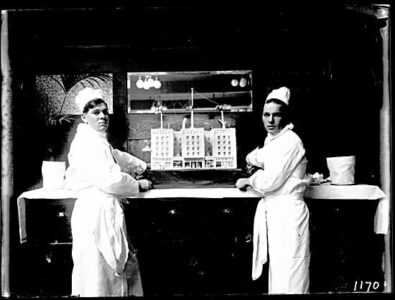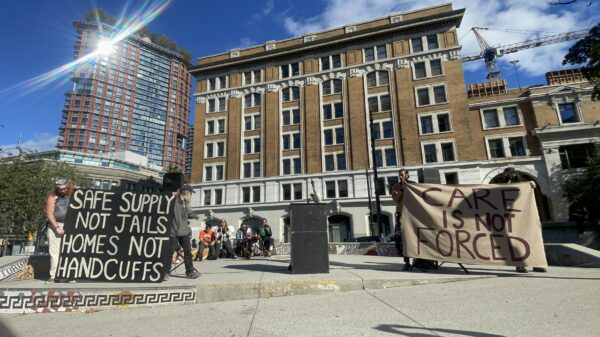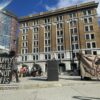On Dec. 18, Vancouver City Council approved the demolition of the Dunsmuir Hotel, a single-room occupancy building with 167 units at the corner of Dunsmuir and Richards Street.
The decision marks yet another feather in the cap of property developer Holborn Properties, with plans for a large-scale residential redevelopment of the site. Holborn has allowed the property to deteriorate for nearly 20 years, and the building has sat empty since 2013.
Under the City’s Single Room Accommodation Bylaw, Holborn is legally required to pay a $300,000 SRO conversion fee for each unit lost to redevelopment.[1] In the case of the Dunsmuir Hotel, this would amount to roughly $50.1 million. Yet city council is reportedly considering an exemption for Holborn, fully or partially freeing the billionaire developer from their obligations under the Bylaw.
This type of multi-million dollar developer exemption would not be surprising in Vancouver – nor would it be new.
In May 2023, ABC City Council voted to retroactively reverse the empty homes tax increase levied on unsold condos, returning $3.8 million to developers who had already paid the City, including Holborn. Millions of dollars were sent back to Holborn and BC’s most cash-flush corporations, depriving the city of desperately-needed revenues at a time of austerity and budget shortfalls across multiple departments – all while homelessness and the housing crisis continue to worsen.
The same ABC-majority Council has bent over backwards for Holborn in countless other ways, including significant concessions at Little Mountain. Exactly one year ago, ABC Council voted to exempt Holborn’s social housing requirements at Little Mountain for the first two phases of the project’s redevelopment.
Holborn famously bought Little Mountain in 2008 and quickly demolished it in 2009, destroying 238 social housing units, and leaving the site empty ever since. In 2006, Holborn bought the Dunsmuir Hotel. In 2013, Holborn evicted all 167 low-income tenants at Dunsmuir and the building has sat empty ever since.
The Dunsmuir was built in 1907 as an upscale hotel and has since served as a youth hostel and different iterations of low-income housing over the decades. Recurrent water damage, particularly within the past five to ten years, has caused irreversible interior and structural decay. A December report from the city’s Chief Building Official strongly recommends demolishing the property within 21 days. On Dec. 18, City Council voted to approve the recommendation and move forward with the demolition.

Bakers with a cake replica of the Dunsmuir Hotel (1908). Photographer: Philip Timms. VPL archive, Accession #: 6889a
Amidst a housing crisis, we might ask why ABC Council would consider rewarding a developer for keeping a property empty for more than a decade. But recall that this is the same council who voted against a proposed increase on the vacancy tax from three to five per cent.
Vancouverites never tire of lamenting the breakneck pace of development. While there is always some truth in this accelerationist narrative, there is also a great untruth, since developers like Holborn keep properties empty for years and often decades. These empty lots have nothing to do with permitting and red tape, and everything to do with profit margins, coordinated scarcity, and the fine-tooth calculations of the local developer oligopoly, always with a central role played by the large banks.
Like any monopoly developer in Vancouver, the Holborn story is about a cash-flush developer sitting on valuable properties and keeping them empty for decades – and, if there happen to be buildings on those properties, letting them fall into disrepair as land value increases.
Right-wing developers like the Vancouver-based Michael Geller have always tried to separate “good” monopoly actors from bad ones, usually along racial lines. Whereas foreign-owned companies like Holborn are evil, “local” developers are white knights who will deliver us the housing supply we desperately need. The problems with this are numerous, but consider the case of the Pantages Theatre, a burning local example that echoes the fate of the Dunsmuir Hotel.
Vancouver’s heritage enthusiasts will no doubt remember the Pantages, a well-preserved and entirely viable theatre that sat empty in the Downtown Eastside for years after a developer purchased it on the cheap and sat back as their equity grew. Some time in the late 2000s, heavy objects were mysteriously thrown through the roof of the Pantages, the damaged roof was never repaired, and years later the water damage was too severe to remedy. As in the case of the Dunsmuir, this same process culminated in a profitable condo redevelopment.
The problem for pundits like Michael Geller is that in the case of the Pantages and countless others like it, the developer was a white guy named Marc Williams and not the much-maligned bogeyman of the Foreign Investor. For his trouble, Williams was rewarded with a zero-interest loan from BC Housing to build an expensive condo called Sequel 138 on the ashes of Pantages – the kind of grift ought long ago to have discredited the political class and actors on both sides of the land grab.

Pantages Theatre interior. Photograph by Dominion Photo Co. (1922). VPL archive, Accession #: 21362
While it can aid their cause, developers don’t need to let a building fall into disrepair to justify its demolition. Well-maintained buildings can be demolished too. Little Mountain was in good condition and had received a new round of upgrades and interior renovations by BC Housing only a year or two before demolition.
When homeless veterans occupied the old Hotel Vancouver after WWII, they too argued that the hotel was in good condition and should be converted into permanent housing. Instead, planners signed off on the building’s purchase and demolition by Eaton’s department store in 1948, putting their resources and energy into tract sprawl.
Some veterans moved into single-family homes at Renfrew Heights (1948) and Fraserview (1950).[2] Yet by the 1950s, market-based tract housing had not solved the homelessness crisis. Homeless veterans squatting the Hotel Vancouver remained homeless. And guess where the remaining residents of Hotel Vancouver were sent following their eviction? The Dunsmuir Hotel! Starting in 1950, the building was run as an SRO by the Salvation Army.[3]
In a recent social media interaction, someone pointed to the systemic issues at play with the Dunsmuir Hotel: “this is a strong argument for not allowing companies to collect property for speculation.”
Geller quickly replied: “No it isn’t…But it is a strong argument for why we should not be bending over backward to accommodate awful developers like Holborn…a disgusting company.” Like clockwork, another account added the usual racial undertones to Geller’s musings: “Import the 3rd world, get 3rd worlders [sic]. Bunch of parasites with no Canadian loyalty, destroying the host.”
Just a really nice group of guys hanging out on Twitter! But seriously, when will we start to realize that the creative destruction imposed by developer capital is a shared sport among all large developers in Vancouver? From hometown heroes like Geller, Marc Williams and Michael Audain (himself a descendent of the Dunsmuir family) to “foreigners” like Holborn – the grift is the same.
Don’t be fooled, the foundation of wealth is inheritance.
The same monopoly-capitalists who shaped BC in the late 19th century continue to expand their wealth and power today. Robert Dunsmuir was a coal baron who “ruthlessly refused to recognize employee grievances and unions.”[4] His son James Dunsmuir became the premier of BC in 1900. As a loyal son and inheritor of the coal empire, James proceeded to oversee some of the most notorious strike-breaking efforts of the early twentieth century. James would rather send in the militia than “cave” to demands for workplace safety and union recognition, at a time when gas explosions took the lives of hundreds of his workers.
Are the exploits of the Dunsmuirs simply consigned to the past? On the contrary, their wealth has today accumulated in the form of property developers and landlords – none more than property developer Michael Audain, the great-grandson of James Dunsmuir. There is no Audain fortune without first the Dunsmuir fortune. Just one block away from the Dunsmuir Hotel we find another crime scene called Larwill Place, and a few blocks further we find the broken promises of 58 West Hastings. The latter was famously promised as 100% social housing, now reduced to less than 50% with the remaining at market rates. The project also been renamed “Bob and Michael’s Place” after two billionaires (one of them being Michael Audain).
At Larwill, exactly one year ago, 100 low-income residents were needlessly displaced for the new Audain-funded Vancouver Art Gallery. Just this month we learned that the project has fallen through. A hundred residents displaced for nothing at Larwill Place; a hundred plus units demolished for nothing at the Dunsmuir Hotel. If there is no justice in all this, at least there is a poetic symmetry.
♦
Notes
[1] See section 4.8(a) of the SRA bylaw, which states: “as a condition of approving a conversion or demolition permit for a designated room, require the owner to pay to the city, for deposit into a reserve fund for the provision of accommodation to replace the accommodation the owner intends to convert or demolish under the conversion or demolition permit, the amount of $300,000 for each designated room.”
[2] Veronica Strong-Boag, “Living,” in Working Lives: Vancouver 1886–1986, Ed. Working Lives Collective (Vancouver: New Star, 1985) p. 93.
[3] Jill Wade, Houses for All: The Struggle for Social Housing in Vancouver, 1919–50 (Vancouver: UBC Press, 1994) p. 145.
[4] Gordon Hak, The Left in British Columbia: A History of Struggle (Vancouver: Ronsdale Press, 2013) p. 13.















